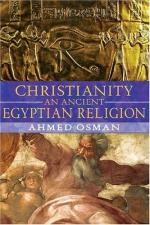|
This section contains 9,659 words (approx. 33 pages at 300 words per page) |

|
From the dawn of Egyptian history, and throughout the three and a half millennia of their currency, religious beliefs and practices were for practical purposes committed to written form. The singular phenomenon of the nation-state the pharaohs had created put far greater stock in the hieroglyphic script, the novel creation of a bureaucracy of wise men, than it did in any memory, individual or collective, that might serve as a repository for the important knowledge of the community. The scribal tradition, therefore, at an early date took precedence over the oral in Egypt, and the scribe became recorder and transmitter of all that was deemed important among the intellectual creations of pharaonic society. Egyptian religion was practiced according to beliefs and directives "as they were [found] in writing," and scorn was poured on anything that remained in an oral stage of transmission. The latter was "the...
|
This section contains 9,659 words (approx. 33 pages at 300 words per page) |

|




